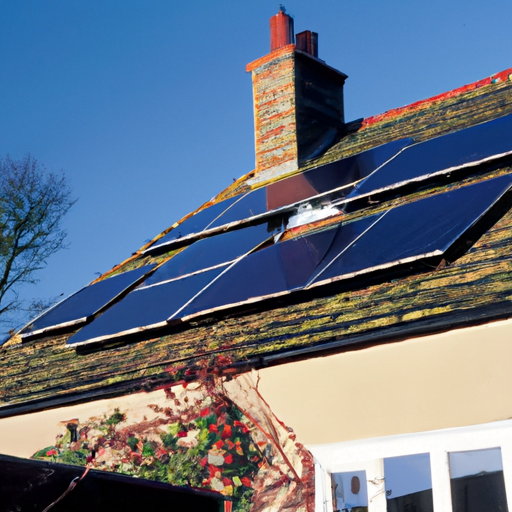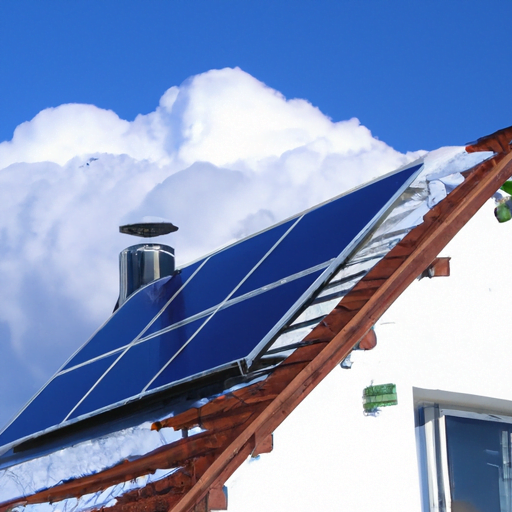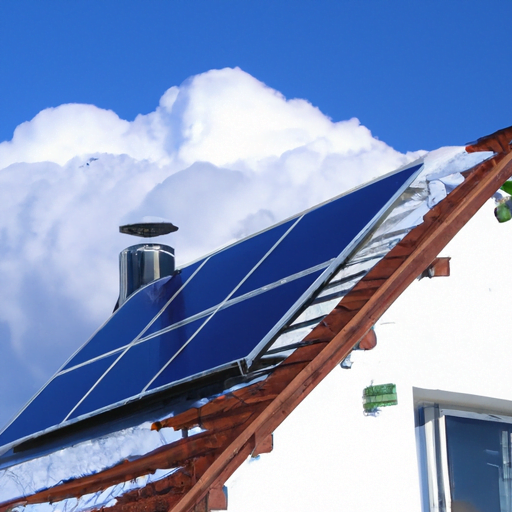So, you’re thinking about living off the grid, huh? That’s a pretty bold move, but I totally get the appeal. Being self-sufficient and reducing your reliance on traditional energy sources can be incredibly liberating. But here’s the thing, when you’re living off the grid, you still need some way to stay warm during those chilly winter months. That’s where solar powered heaters come in.
Now, you might be wondering, “is there really such a thing as a solar powered heater?” Well, the answer is yes! Solar powered heaters are a fantastic option for off grid living, as they harness the power of the sun to generate heat. They work by collecting sunlight using solar panels, which then convert that energy into heat. This heat can then be distributed throughout your living space, keeping you cozy even when the sun isn’t shining.
But wait, there’s more to it! Solar powered heaters come in various types and designs, so you can find one that suits your specific needs. Some models can even store excess energy for use during cloudy days or at night. In our upcoming article, we’ll explore the different types of solar powered heaters available, their pros and cons, and provide you with some tips on how to choose the right one for your off grid lifestyle. So, stay tuned to learn all about this innovative and sustainable heating solution!

Exploring Solar Powered Heaters
In today’s world, where energy costs are constantly rising and environmental concerns are at an all-time high, finding alternative sources of energy has become more important than ever. One such energy-saving solution is the use of solar powered heaters. These innovative heating systems harness the power of the sun to provide warmth, reducing energy costs and minimizing the impact on the environment. In this article, we will delve into the benefits, functionality, types, advantages, and installation of solar powered heaters, as well as compare them to traditional heaters.
Benefits of Solar Powered Heaters
Reduced energy costs
One of the primary benefits of solar powered heaters is the significant reduction in energy costs. By using sunlight as the main source of energy, these heaters eliminate or greatly reduce the need for electricity or natural gas, resulting in substantial savings on utility bills. With rising energy costs, the ability to heat your home or water without relying solely on the grid can make a significant difference in your monthly expenses.
Environmentally-friendly
Solar powered heaters are an environmentally-friendly heating solution. They rely on clean, renewable energy from the sun, reducing the dependence on fossil fuels and reducing carbon emissions. By opting for solar heating, you contribute to environmental conservation and help reduce the overall carbon footprint, making it a sustainable choice for the planet.
Independence from the grid
One of the most appealing aspects of solar powered heaters is their ability to provide independence from the grid. With a solar heater, you no longer have to worry about power outages or fluctuations in the energy supply. This level of self-sufficiency allows you to maintain comfort and warmth even during emergencies, ensuring a reliable source of heat at all times.
How Solar Powered Heaters Work
Solar powered heaters operate on a simple principle – harnessing sunlight and converting it into heat energy. The process involves the use of solar panels, heat transfer mechanisms, and a heating system. Let’s take a closer look at how these elements work together.
Solar panels to harness sunlight
The heart of a solar powered heater is the solar panel system. These panels are composed of photovoltaic cells that absorb sunlight and convert it into electricity. The panels are typically installed on the roof or in an area that receives direct sunlight for the majority of the day. As sunlight hits the panels, electrons are released within the photovoltaic cells, creating an electric current that can be used to power various appliances or stored for future use.
Conversion of sunlight into heat energy
Once the solar panels generate electricity, it is directed to a heating element within the solar powered heater. This heating element, often in the form of a heat exchanger or a heat transfer fluid, absorbs and stores the heat energy generated from the sunlight. The heat is then transferred to the heating system, providing warmth to the desired area, such as a room or a water storage tank.
Heat transfer to provide warmth
The heating system in a solar powered heater can vary depending on the type of heater. For air heaters, a fan distributes the warm air throughout the room, while for water heaters, the heated water is stored and circulated through pipes or valves to reach faucets and showers. In both cases, the heat transfer process ensures that the collected solar energy is effectively utilized to provide the needed warmth.
Different Types of Solar Powered Heaters
Solar powered heaters come in various types, each catering to different heating needs. Let’s explore the three primary types of solar powered heaters:
Solar air heaters
Solar air heaters are designed to heat the air inside a room or building. They work by drawing in air, passing it through a solar collector, and then distributing the heated air back into the space. These heaters are particularly effective in climates where heating needs are primarily focused on maintaining room temperature.
Solar water heaters
Solar water heaters utilize sunlight to heat and maintain the temperature of water used for various purposes such as bathing, washing dishes, or laundry. These heaters consist of solar collectors that absorb heat from the sun and transfer it to the water storage tank. Solar water heaters are ideal for households that require a constant supply of hot water throughout the year.
Solar space heaters
Solar space heaters are a combination of solar air heaters and solar water heaters. These systems use solar collectors to heat a fluid, which is then circulated through pipes or radiators to provide both air and water heating. Solar space heaters are suitable for larger spaces or buildings that require heating for multiple purposes.

Advantages of Solar Air Heaters
Solar air heaters offer several advantages that make them an appealing choice for homeowners seeking an efficient and sustainable heating solution.
Efficient heating
Solar air heaters are remarkably efficient in converting sunlight into heat energy. The solar collectors used in these heaters can reach high temperatures and effectively distribute warm air throughout the room. By significantly reducing the need for electricity or gas-powered heating systems, solar air heaters can save a considerable amount of energy and money.
Improved indoor air quality
Unlike traditional heaters, solar air heaters do not generate any pollutants or greenhouse gas emissions during operation. This leads to improved indoor air quality, as there is no combustion or release of harmful gases. Additionally, solar air heaters can help decrease the amount of dust and allergens in the air, providing a healthier environment for you and your family.
Easy installation
Solar air heaters are relatively easy to install and can be integrated into existing heating systems. With minimal modifications to your home’s infrastructure, you can enjoy the benefits of solar heating in no time. Professional installation is recommended to ensure optimal performance and efficiency.
Benefits of Solar Water Heaters
Solar water heaters offer several advantages that make them a popular choice for homeowners looking to reduce their energy bills and ensure a constant supply of hot water.
Hot water throughout the year
One of the main benefits of solar water heaters is the ability to provide hot water throughout the year, regardless of the weather conditions. Even on cloudy days, solar water heaters can still generate enough heat to warm the water, ensuring a consistent supply of hot water for all your needs.
Significant reduction in energy bills
By utilizing solar energy to heat your water, solar water heaters can drastically reduce your energy bills. The electricity or gas consumption required to maintain the temperature of the water is significantly reduced or eliminated, resulting in substantial long-term savings.
Low maintenance requirements
Solar water heaters generally have low maintenance requirements, especially when compared to traditional water heaters. The absence of moving parts and the durable nature of the solar components contribute to the longevity and reliability of these systems. Regular inspections and cleaning of the solar collectors ensure optimal performance and efficiency.
Features of Solar Space Heaters
Solar space heaters offer several unique features that make them a versatile heating solution for various applications.
Direct and indirect heating methods
Solar space heaters can employ both direct and indirect heating methods. In direct heating, the sunlight is converted into heat energy, which is then distributed through air or water channels to heat the desired space. In indirect heating, the collected solar energy is used to heat a fluid, typically water or antifreeze, which is then circulated through radiators or a heat exchanger to provide warmth.
Multiple heating modes
Solar space heaters often come equipped with multiple heating modes, allowing you to customize the settings based on your specific heating needs. These modes can vary from low power for milder weather conditions to high power for colder climates, ensuring that your space is adequately heated year-round.
Safety features
Solar space heaters are designed with safety in mind. Many models are equipped with built-in safety features such as automatic temperature control, overheat protection, and freeze protection. These features ensure that the heater operates smoothly and efficiently while minimizing the risk of accidents or damage.
Factors to Consider before Purchasing a Solar Powered Heater
Before investing in a solar powered heater, there are several factors you should consider to ensure that it meets your specific needs and requirements.
Available space and location
The available space and location of your property will determine the type and size of solar powered heater that can be installed. Assess the available roof space for solar panels or the area for ground-mounted systems to determine if it can accommodate the required equipment.
Climate and weather conditions
The climate and weather conditions in your region play a crucial role in determining the efficiency and effectiveness of solar powered heaters. Areas with ample sunlight will naturally benefit more from solar heating compared to regions with frequent cloud cover or limited sun exposure.
Budget and cost-effectiveness
While solar powered heaters can lead to long-term savings, it is important to consider the initial investment and installation costs. Evaluate your budget and determine the cost-effectiveness of a solar powered heater based on your energy consumption, utility rates, and available incentives or rebates.
Installation and Maintenance of Solar Powered Heaters
Proper installation and regular maintenance are key to ensuring the optimal performance and longevity of your solar powered heater.
Proper positioning of solar panels
During installation, it is crucial to position the solar panels in an area that receives maximum sunlight throughout the day. A qualified installer can assess your property and identify the most suitable location for optimal solar energy absorption.
Regular cleaning and inspection
Regular cleaning and maintenance of your solar panels are essential to ensure their efficiency. Keep the panels free from dirt, debris, and snow during the winter months to ensure maximum sunlight absorption. Additionally, periodic inspections should be conducted to identify any potential issues or damage.
Troubleshooting common issues
In the event of any problems with your solar powered heater, it is advisable to contact a professional for assistance. Common issues may include faulty wiring, reduced heat output, or system malfunctions. A qualified technician will be able to diagnose and rectify the problem effectively.
Solar Powered Heaters vs. Traditional Heaters
Solar powered heaters offer several advantages over traditional heating systems. Let’s compare them in terms of energy efficiency, environmental impact, and long-term cost savings.
Energy efficiency comparison
Solar powered heaters are highly energy-efficient compared to traditional heaters. By using the abundant and renewable energy from the sun, solar heaters can significantly reduce or eliminate the need for other energy sources. Traditional heaters, on the other hand, rely on fossil fuels or electricity, which are subject to market fluctuations and availability.
Environmental impact
Solar powered heaters have a minimal environmental impact compared to traditional heaters. They produce zero greenhouse gas emissions during operation, helping combat climate change. Traditional heaters, especially those powered by fossil fuels, release harmful pollutants into the atmosphere, contributing to air pollution and environmental degradation.
Long-term cost savings
Although the initial investment for solar powered heaters can be higher than traditional heaters, they offer substantial long-term cost savings. Solar heaters rely on free sunlight as their primary energy source, reducing or eliminating the need for purchased energy. Over time, the savings on energy bills can offset the initial investment and lead to significant cost savings.
Conclusion
Solar powered heaters provide an efficient, environmentally-friendly, and cost-effective solution to meet your heating needs. Whether you choose solar air heaters, solar water heaters, or solar space heaters, these systems offer numerous benefits, including reduced energy costs, improved indoor air quality, and independence from the grid. Before making a purchase, consider factors such as available space, climate conditions, and budget to ensure a suitable solar powered heater for your home. With proper installation and maintenance, you can enjoy the warmth and comfort of solar heating while simultaneously contributing to a sustainable future.




